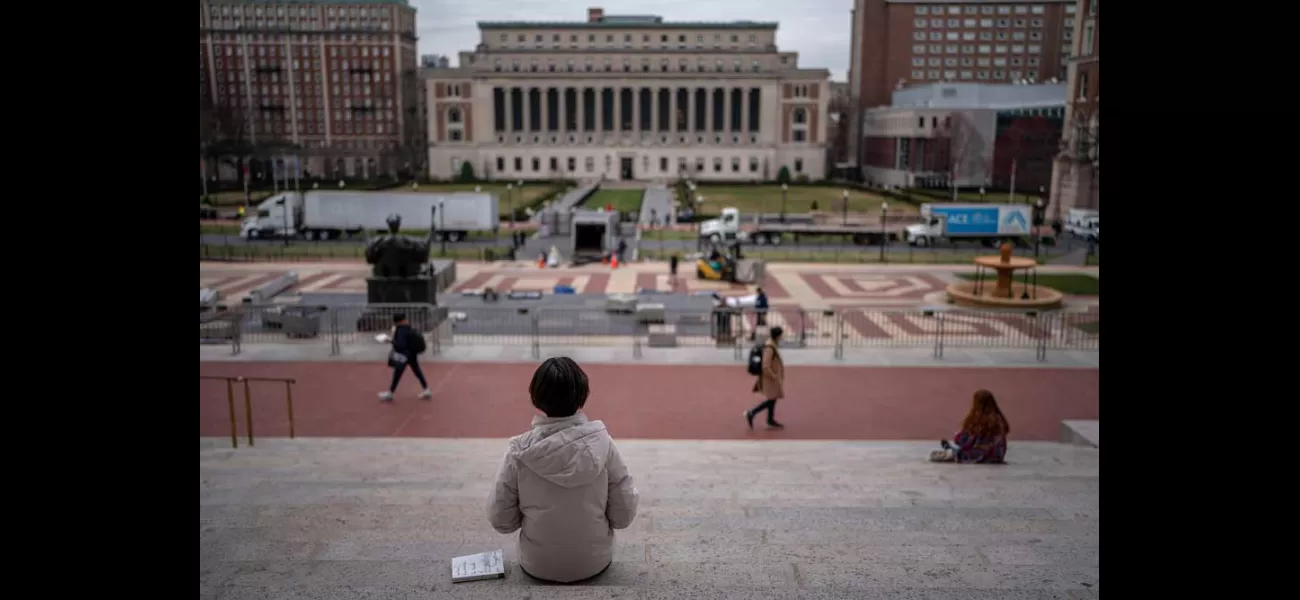Chinese students in US taking a stand for their beliefs, but must be mindful of the risks.
Inspired by protests in their home country, they're learning how to organize, though Beijing could be keeping an eye on them.
April 28th 2023.

“Evan” stands in a park near Columbia University, on March 31st, 2023, with a determined look on his face. He is a Chinese grad student and a member of the Columbia White Paper Society - a group formed to challenge the Chinese Communist Party's orthodoxy.
As he explains, this group is crucial because it gives Chinese students in the US a space to connect and share their experiences, something they cannot do back home. It also provides an opportunity to explore ways of actively engaging in the movement for change within the safety of the US.
This group takes its name from protests in China that began last fall, in response to the CCP's zero-COVID restrictions and the deadly fire in Xinjiang. Evan acknowledges the risks associated with openly criticizing the Chinese government, even in the US, but he and his classmates are determined to make their voices heard - a “political coming out” of sorts.
The reality of this situation is sobering; overseas Chinese students who have spoken against the CCP have been harassed by peers, while security officials have visited their families back home. The US Department of Justice has indicted 44 people, including 34 Chinese national police officers, for transnational repression of CCP critics.
Therefore, Evan and his peers are taking the necessary precautions to ensure their safety. They are mindful of the fact that Chinese students studying in the US should not feel that they have to join the Chinese Students Scholars Association (CSSA) to fit in, as some of its chapters reportedly receive funding from Beijing. They are also aware of several cases of physical and cyber intimidation of students who have spoken out against the CCP.
But even with these risks, Evan, Shawn and Sveta Lee, another White Paper Society member, are determined to continue their efforts to keep the movement alive and foster a sense of solidarity. They believe that their actions can make a difference, and that one day, the Chinese people will be able to exercise their right to freedom of speech without fear of retribution.

(Image Source: https://www.rfa.org)
Evan, a Chinese graduate student at Columbia University in New York, is forming a group to challenge the orthodoxy of his government back home, something he can do without fear of consequence in the United States. He is joined by a number of students who are eager to form a community and feel a sense of solidarity.
Despite being 7,000 miles away from Beijing, Evan and his peers are aware of the risks associated with openly criticizing the Chinese Communist Party. From zero-COVID restrictions to a deadly fire in Xinjiang, the group, aptly named the Columbia White Paper Society, channels the same spirit of protest that has landed many of its supporters in jail.
The U.S. government and human rights groups have reported incidents of “transnational repression” of CCP critics, such as the harassment of overseas Chinese students and visits to family members back home. This is a stark reminder for Evan and his classmates of the importance of carefully proceeding in their movement.
Sveta Lee, a White Paper Society member, has experienced the lengths of the CCP's transnational reach firsthand. From her detention in Belarus for taking part in a protest against the country's strongman, to posters being ripped off of bulletin boards and vandalized on the Columbia campus, Lee has seen the impact of speaking out.
Nevertheless, Evan and his peers are determined to press on. As they embark on what some activists call a “political coming out”, the Columbia White Paper Society is a safe haven for Chinese students to hone their worldviews beyond the narrow lens of their government.

(Image Source: https://www.rfa.org)

(Image Source: https://www.rfa.org)
As he explains, this group is crucial because it gives Chinese students in the US a space to connect and share their experiences, something they cannot do back home. It also provides an opportunity to explore ways of actively engaging in the movement for change within the safety of the US.
This group takes its name from protests in China that began last fall, in response to the CCP's zero-COVID restrictions and the deadly fire in Xinjiang. Evan acknowledges the risks associated with openly criticizing the Chinese government, even in the US, but he and his classmates are determined to make their voices heard - a “political coming out” of sorts.
The reality of this situation is sobering; overseas Chinese students who have spoken against the CCP have been harassed by peers, while security officials have visited their families back home. The US Department of Justice has indicted 44 people, including 34 Chinese national police officers, for transnational repression of CCP critics.
Therefore, Evan and his peers are taking the necessary precautions to ensure their safety. They are mindful of the fact that Chinese students studying in the US should not feel that they have to join the Chinese Students Scholars Association (CSSA) to fit in, as some of its chapters reportedly receive funding from Beijing. They are also aware of several cases of physical and cyber intimidation of students who have spoken out against the CCP.
But even with these risks, Evan, Shawn and Sveta Lee, another White Paper Society member, are determined to continue their efforts to keep the movement alive and foster a sense of solidarity. They believe that their actions can make a difference, and that one day, the Chinese people will be able to exercise their right to freedom of speech without fear of retribution.

(Image Source: https://www.rfa.org)
Evan, a Chinese graduate student at Columbia University in New York, is forming a group to challenge the orthodoxy of his government back home, something he can do without fear of consequence in the United States. He is joined by a number of students who are eager to form a community and feel a sense of solidarity.
Despite being 7,000 miles away from Beijing, Evan and his peers are aware of the risks associated with openly criticizing the Chinese Communist Party. From zero-COVID restrictions to a deadly fire in Xinjiang, the group, aptly named the Columbia White Paper Society, channels the same spirit of protest that has landed many of its supporters in jail.
The U.S. government and human rights groups have reported incidents of “transnational repression” of CCP critics, such as the harassment of overseas Chinese students and visits to family members back home. This is a stark reminder for Evan and his classmates of the importance of carefully proceeding in their movement.
Sveta Lee, a White Paper Society member, has experienced the lengths of the CCP's transnational reach firsthand. From her detention in Belarus for taking part in a protest against the country's strongman, to posters being ripped off of bulletin boards and vandalized on the Columbia campus, Lee has seen the impact of speaking out.
Nevertheless, Evan and his peers are determined to press on. As they embark on what some activists call a “political coming out”, the Columbia White Paper Society is a safe haven for Chinese students to hone their worldviews beyond the narrow lens of their government.

(Image Source: https://www.rfa.org)

(Image Source: https://www.rfa.org)
[This article has been trending online recently and has been generated with AI. Your feed is customized.]
[Generative AI is experimental.]
0
0
Submit Comment





